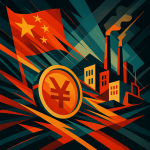Key Points
- The State Council, led by Premier Li Qiang (Li Qiang 李强), approved a Manufacturing Green and Low-Carbon Development Action Plan (2025-2027) to push sustainable industrial practices.
- The plan focuses on green technological innovation, transforming traditional industries with advanced equipment, and ensuring emerging industries adhere to high green standards.
- Improvements to the Transverse Ecological Protection Compensation Mechanism aim for fairer sharing of environmental protection costs/benefits and promoting collaborative governance, guided by the principle: “whoever pollutes, governs; whoever protects, benefits.”
- A Draft Amendment to the Food Safety Law aims to create a more scientific and rigorous system with a focus on pre-emptive prevention and stringent regulation across the entire supply chain.
- The government is emphasizing severe punishment without leniency for food safety violations and attracting social capital participation in ecological construction.

Big news coming out of Beijing: China’s State Council, led by Premier Li Qiang (Li Qiang 李强), just wrapped an executive meeting on May 23, 2025, dropping some major policy roadmaps that tech heads, investors, and founders need to watch closely. This isn’t just talk; it’s a strategic push towards a greener, safer, and more sustainable future, starting with a significant Manufacturing Green and Low-Carbon Development Action Plan (2025-2027).
Let’s break down what went down and why it matters.
- Green Technological Innovation: Accelerate R&D and application of advanced green technologies.
- Traditional Industry Transformation: Implement green upgrades using advanced equipment and processes.
- Emerging Industry Standards: Promote high-standard green development and clean energy adoption.
- Resource Utilization: Enhance resource recycling efficiency.
- Problem Solving & Standards: Address common challenges and improve green manufacturing standards.
Greenifying China’s Manufacturing Engine: The 2025-2027 Action Plan
The headline act was the approval of the Manufacturing Green and Low-Carbon Development Action Plan (2025-2027).
The message from the top is clear: going green in manufacturing isn’t a ‘nice-to-have’ anymore; it’s a core trend and a pillar of China’s “new industrialization.”
Key Focus Areas for a Greener Industry:
- Turbocharging Green Tech: Expect a major push for green technological innovation.
- This means faster development and wider application of advanced green technologies across the board.
- Traditional Industries Get a Green Makeover: Think deep green transformation.
- This involves rolling out advanced equipment and processes, especially in conjunction with policies like the ongoing large-scale equipment renewal initiative.
- The goal? To accelerate green upgrading in key sectors – a huge opportunity for suppliers of eco-friendly tech.
- Emerging Industries to Lead in Green Standards: These sectors are expected to aim for high-standard green development from the get-go.
- This includes increased adoption of clean energy and green products.
- Enhancing resource recycling is also a big part of this.
-
Solving Common Problems & Setting Standards: Efforts will intensify to:
- Tackle common technical challenges in green manufacturing.
- Improve standards in key areas (think emissions, efficiency, materials).
- Optimize relevant policies to support the green shift.
- Perfect the green manufacturing and service system.
- The ultimate aim is to better support and assist enterprises in their own transformation and upgrading journeys.

Find Top Talent on China's Leading Networks
- Post Across China's Job Sites from $299 / role
- Qualified Applicant Bundles
- One Central Candidate Hub
Your First Job Post Use Checkout Code 'Fresh20'

Rethinking Ecological Protection: Fine-Tuning the Compensation Mechanism
Beyond the factory floor, the State Council also zeroed in on improving the Transverse Ecological Protection Compensation Mechanism.
This is all about creating a fair system where the costs and benefits of environmental protection are shared, promoting collaborative governance.
Why is this a big deal?
It’s crucial for strengthening ecological environmental protection and fostering coordinated regional development.
What’s Changing in Eco-Compensation:
-
Clearer Rules, More Options: The goal is a more comprehensive mechanism with:
- Clearer rights and responsibilities for all parties.
- More diverse methods of compensation.
- More efficient governance.
- This will involve specifying key tasks and implementation measures to ensure a positive interaction between ecological product providers and beneficiaries. (Think regions preserving a water source getting compensated by regions benefiting from that clean water).
-
Expanding the Scope:
- Deepen the construction of these mechanisms for the main streams of major rivers.
- Steadily expand compensation areas.
- Actively explore compensation methods for other ecological environmental factors, including forests, grasslands, and air quality.
- Rewards and Punishments: Improving institutional mechanisms with clear rewards and punishments is key.
- The guiding principle here is stark: “whoever pollutes, governs; whoever protects, benefits.”
- They’ll be researching and improving incentive and restraint policies to attract more social capital participation in ecological civilization construction. This could mean new investment avenues.

ExpatInvest China
Grow Your RMB in China:
- Invest Your RMB Locally
- Buy & Sell Online in CN¥
- No Lock-In Periods
- English Service & Data
- Start with Only ¥1,000

Beefing Up Food Safety: A Legal Overhaul on the Menu
Finally, the meeting deliberated on the Draft Amendment to the Food Safety Law of the People’s Republic of China.
This draft is now heading to the Standing Committee of the National People’s Congress for review.
The emphasis? Food safety is non-negotiable as it’s directly related to life and health.
- Improved Legal Provisions: Enhance laws based on addressing urgent needs.
- More Rigorous Standards: Build a scientific and rigorous standard system focusing on mandatory standards.
- Shift to Prevention: Promote pre-emptive prevention in governance model.
- End-to-End Regulation: Strengthen oversight from farm to table.
- Local Oversight: Increase regulatory focus and strict inspections at local levels.
- Severe Consequences: Launch crackdowns, handle spot check results rigorously, and apply severe punishment without leniency.
Key Upgrades to Food Safety Regulations:
- Addressing Urgent Needs First: Relevant legal provisions will be improved based on this principle.
- More Rigorous Standards: Building a more scientific and rigorous food safety standard system.
- A special focus will be on mandatory standards – making them tougher and more comprehensive.
- Shift to Prevention: Further promoting the transformation of the food safety governance model towards pre-emptive prevention. It’s about stopping problems before they start.
- End-to-End Regulation: Strengthening regulation across the entire chain – from farm to table.
- Localizing Oversight: Pushing regulatory focus downwards, meaning more responsibility and scrutiny at local levels.
- Daily supervision and inspection will be strictly conducted.
-
Crackdowns and Consequences:
- Launching special campaigns focusing on key (problematic) areas.
- Results of supervisory spot checks will be rigorously handled.
- Identified problems will be severely punished according to law without leniency.
- The overarching goal is continuously improving the food safety system.
The meeting also touched on other matters, but these three pillars – green manufacturing, ecological compensation, and food safety – signal significant shifts.
For anyone operating in or watching the Chinese market, these developments are critical. They highlight new compliance landscapes, investment opportunities in green tech and services, and a government serious about long-term sustainable development and citizen well-being. This Manufacturing Green and Low-Carbon Development Action Plan (2025-2027) is just the beginning of a new chapter for industry in China.

Resume Captain
Your AI Career Toolkit:
- AI Resume Optimization
- Custom Cover Letters
- LinkedIn Profile Boost
- Interview Question Prep
- Salary Negotiation Agent





